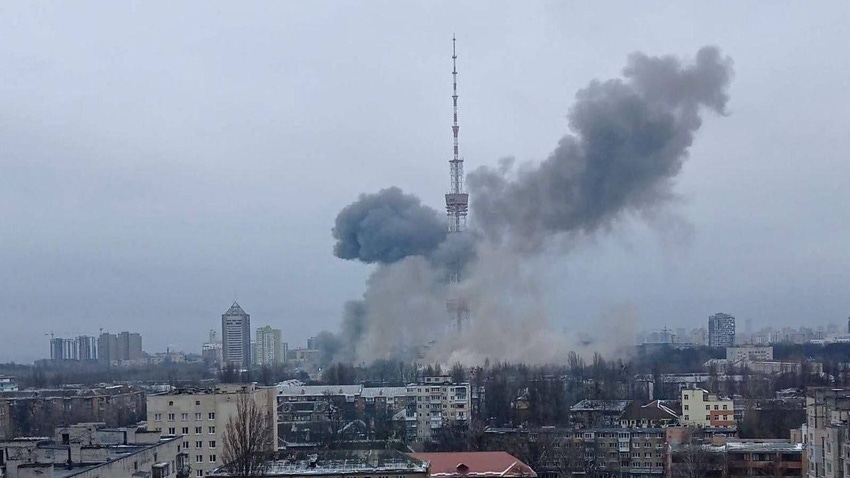Kyivstar plans to invest $600M in Ukraine as war rages on
Despite the ongoing war in Ukraine, its largest operator Kyivstar is investing $600 million in the country, as it hopes to be part of a future reconstruction effort.

Despite the ongoing war in Ukraine, its largest operator Kyivstar is making plans for the future, hoping to be part of the reconstruction effort once the fighting is over. During a recent press roundtable, Oleksandr Komarov, CEO of the VEON-owned telco, said it plans to invest $600 million in the Ukrainian economy.
While Kyivstar appreciates the risks of investing in the current environment, Komarov said the company is taking an "opportunistic" approach. "We are acting very opportunistically, we are quite confident that Ukraine will win […], and we will have a chance to participate in one of the biggest development projects in Europe in the 21st century. So this is our bet," he said.
While he admitted that maintaining the network – which in some places is under constant risk from artillery fire – remains Kyivstar's top priority, he also said work is underway to achieve 98% 4G coverage. Currently, the figure is around 93% and progress is likely to be slow, Komarov acknowledged, as some of the areas outside coverage are hard to reach. Many are in rural parts of the country, or along roads.
This is more of a social project for Kyivstar, Komarov said, as it will take more than ten years to get a return on investment, compared to the average of five years for the telco and other VEON businesses.
Kyivstar is not looking to launch 5G at present, while the war is still ongoing. The Ukrainian regulator had plans to conduct a 5G spectrum auction in 2022, but this was put on hold due to the Russian invasion.
At the same time, 3G remains an important part of the country's network. While Kyivstar hopes to one day switch off the network, it is tricky to do so because a large share of 3G infrastructure services voice traffic rather than data traffic, Komarov explained. Currently, the telco's average customer makes 500 to 600 minutes worth of voice calls each month. As a result, he predicts 3G will not be switched off until 2025.
Part of the $600 million investment is aimed at upgrading Ukraine's fiber network to support 1Gbit/s services, although Komarov admitted that the "geographical priorities" of this project are to some extent set by the war. Still, Kyivstar already has the biggest 1Gbit/s fiber-to-the-premises (FTTP) network in the country with 1 million houses connected, said Komarov.
Social impact
He also said the operator is open to growing its fiber network non-organically if an opportunity presents itself. Ukraine currently has about 3,000 fixed network operators, including numerous small local players, by his estimate. As a result, the market is due for consolidation, in which Kyivstar is ready to participate, he said.
But the company also has plans to expand outside of its core business, with non-organic growth in the digital segment identified as another priority. For example, last year, Kyivstar bought a controlling stake in medical information system Helsi, through which it provides remote appointments for patients free of charge. Kyivstar wants to invest in this further to develop the platform into a B2C solution.
Komarov said that social impact is a key consideration for any investment. Initially, Kyivstar explored the education sector but did not find a suitable opportunity. "We didn't find a niche big enough, developed enough," he admitted.
At the same time, Kyivstar has already donated 300 million Ukrainian hryvnia (US$8.13 million) to United24, a platform where businesses and individuals can make donations directly to the Ukrainian government.
Other investment priorities include the cloud, which Kyivstar sees as a complementary service it can provide for its B2B clients. While cloud services have seen 55% growth, this is in large part due to the free capacity offered by providers like Microsoft and AWS. It is yet to be seen how this will translate into paid services after the war, said Komarov.
Big data, which was Kyivstar's fastest-growing revenue stream before Russia's full-scale invasion, also remains an important area for potential investment.
On the B2C side, meanwhile, the company is digitizing internal processes and services, and looking into how it can improve the My Kyivstar self-service application. Kyivstar also has a large on-demand video offering and is currently offering lots of content free of charge. This includes educational material prepared for schoolchildren studying remotely.
Related posts:
— Tereza Krásová, Associate Editor, Light Reading
Read more about:
EuropeAbout the Author(s)
You May Also Like












